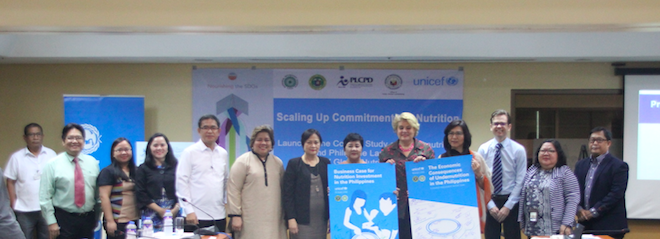Philippines losing P220bn every year as a result of child malnutrition: Costing study calls on government for strategic investment and policies
The Philippines loses about 220 billion pesos annually due to high prevalence of undernutrition among children. This was highlighted at the launch of two costing studies today that call on the government for better public investment and policy reform to improve children’s nutrition and avert the country from economic loss.
The Department of Health (DOH) and the National Nutrition Council (NNC), along with the Philippine Legislators’ Committee on Population and Development (PLCPD) and UNICEF launched the Economic Consequences of Undernutrition in the Philippines and the 2017 Global Nutrition Report at the House of Representatives. The two studies carry empirical and scientific evidence that are aimed to guide legislators in prioritizing investments for nutrition through the national budgeting processes.
“This situation cannot remain unchanged. Strategic investments and policies are needed if the country is serious about development. We must continuously work in the government to ensure sufficient and sustainable allocations for nutrition programs and policies; and never hesitate in investing in the health and nutrition of our country’s future: the children,” said Rep. Jocelyn Limkaichong, Vice Chairperson of the Committee on Ways and Means and member of the Committee on Appropriations.
The costing study on undernutrition reveals that the Philippines loses approximately 220 billion pesos per year due to the effects of undernutrition such as stunting, anemia, and iodine deficiency. This is equivalent to 1.5% of the Philippine GDP in 2015. This can be countered by investments in nutrition, which return around 12 dollars in foregone earnings or health expenditures due to undernutrition for every dollar spent in targeted nutrition interventions.
“Malnutrition robs our children of their foundational health and fundamental right to survive, thrive and reach their full potential. If not addressed immediately, these children will remain as outliers in society, with poor performance in school and low productivity as adults in the future. Thus, if not mitigated, this situation perpetuates the cycle of poverty. Only healthy children can have the chance to succeed in life,” said UNICEF Philippines Representative Lotta Sylwander.
Meanwhile, the 2017 Global Nutrition Report highlights the interrelatedness of nutrition with 12 out of the 17 Sustainable Development Goals (SDGs). This means eradicating malnutrition will contribute significantly to the overall development of the country.
“The Philippines is already considered a trailblazer on nutrition policies in the international community. But we have much work to do since the situation of undernutrition among children is worsening: the Philippines is still one of the nine countries in the world with most cases of stunting, or too short for age, and wasting, or too thin for height, among children. So we encourage everyone to join us in the Scaling Up Nutrition or SUN movement of the Philippines,” said DOH Assistant Secretary Bernie Flores.
“Mainstreaming nutrition in the development agenda is one of the best approaches that government can adopt to accelerate economic and social progress and at the same time fulfilling the people’s right to a happy and healthy life. This is the reason why we in the civil society will never tire in pushing this government to consider all strategies that put people at the center when designing its development agenda. A stronger political will can transform our goals into sustainable action. Together, let us hold one another accountable for our commitments and make sure that our actions will lead to concrete improvements in the nutrition situation of our country,” said Mr. Romeo Dongeto, PLCPD Executive Director as he closed the launch.
Representatives from Congress including Teddy Baguilat, Bernadette Herrera-Dy, Jocelyn Limkaichong and Anna Villaraza-Suarez, as well as executive agencies represented by Undersecretary Luzviminda Ilagan of the Department of Social Welfare and Development, Assistant Cabinet Secretary Evelyn Dela Cruz Cruzada, Assistant Secretary Bernardita Flores of NNC, and Assistant Secretary Ernesto Perez of Department of Trade and Industry signified their support to sustain and scale up investments in nutrition.

